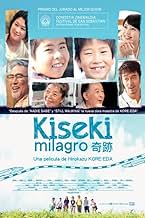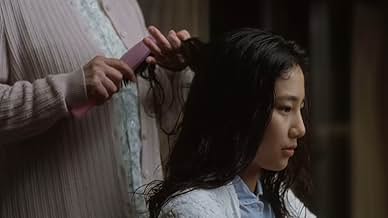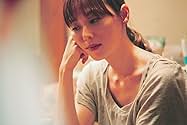IMDb रेटिंग
7.3/10
8.3 हज़ार
आपकी रेटिंग
अपनी भाषा में प्लॉट जोड़ेंTwelve-year-old Koichi, who has been separated from his brother Ryunosuke due to his parents' divorce, hears a rumor that the new bullet trains will precipitate a wish-granting miracle when ... सभी पढ़ेंTwelve-year-old Koichi, who has been separated from his brother Ryunosuke due to his parents' divorce, hears a rumor that the new bullet trains will precipitate a wish-granting miracle when they pass each other at top speed.Twelve-year-old Koichi, who has been separated from his brother Ryunosuke due to his parents' divorce, hears a rumor that the new bullet trains will precipitate a wish-granting miracle when they pass each other at top speed.
- पुरस्कार
- 5 जीत और कुल 9 नामांकन
Kôki Maeda
- Koichi
- (as Koki Maeda)
Ôshirô Maeda
- Ryunosuke
- (as Oshiro Maeda)
Nene Ôtsuka
- Nozomi (Mother)
- (as Nene Ohtsuka)
फ़ीचर्ड समीक्षाएं
If, as many have pointed out, Koreeda is Ozu's cinematic heir, then I Wish is Koreeda's take on Ozu's Good Morning. Both films focus on adorable young kids and Japanese family life, and I have no qualms about saying between the two films, Koreeda easily outdoes Ozu. Not only is Koreeda's depiction of children subtler and more intuitive (no fart jokes here), but he coaxes wonderfully naturalistic performances from his child actors. Is there a director alive who does better work with kids than Koreeda? The movie really takes flight once the kids hit the road on their quest, and I loved the Ozu-ish part where they meet an elderly couple that takes in all the children for a night. Just a wonderful movie with tons of heart. Puts the human in humanistic filmmaking.
This is the story of two young Japanese brothers who live apart following the break-up of their parents' relationship. The older boy dreams of his family reuniting and prays for a miraculous intervention in the form of a volcanic eruption, hoping this might lead to his evacuation from his grandparents' region and a return home. Then, when he discovers that the passing of the speeding Bullet trains, approaching from opposite directions, creates a 'cosmic' moment during which wishes are granted, he sets out with a few friends to meet his brother at the meeting point on the railway line. There they make their wishes - with varying results.
The two brothers are forced to deal with the consequences of their parents' choices, ones they have had no part in making. Their belief, to varying degrees, in the power of 'faith' (believing that wishes can come true) then leads them to have to face the consequences of their own choices. Given their youthful immaturity, there is real poignancy in witnessing their confrontation with some harsh realities.
The movie features brilliant performances from the young actors and an excellent supporting cast of adults. There is also gorgeous and evocative cinematography, scenes of the Japanese countryside and its urban impositions, not least the Bullet line itself elevated on its concrete trackbed.
It takes some time, too long perhaps, for the story to gain momentum. But once the youngsters embark on their journey to meet the trains, the story moves at a brisker, more engaging pace. The climax (yes there is a climax, contrary to the view of another reviewer) brings moments of intense beauty and sharp sadness, regret for the loss of childish innocence of as well as optimism in the hope for a better future.
So this is a slow-burner, but persistence brings rewards. Recommended.
(Viewed at The Cornerhouse, Manchester, UK 21.02.13)
The two brothers are forced to deal with the consequences of their parents' choices, ones they have had no part in making. Their belief, to varying degrees, in the power of 'faith' (believing that wishes can come true) then leads them to have to face the consequences of their own choices. Given their youthful immaturity, there is real poignancy in witnessing their confrontation with some harsh realities.
The movie features brilliant performances from the young actors and an excellent supporting cast of adults. There is also gorgeous and evocative cinematography, scenes of the Japanese countryside and its urban impositions, not least the Bullet line itself elevated on its concrete trackbed.
It takes some time, too long perhaps, for the story to gain momentum. But once the youngsters embark on their journey to meet the trains, the story moves at a brisker, more engaging pace. The climax (yes there is a climax, contrary to the view of another reviewer) brings moments of intense beauty and sharp sadness, regret for the loss of childish innocence of as well as optimism in the hope for a better future.
So this is a slow-burner, but persistence brings rewards. Recommended.
(Viewed at The Cornerhouse, Manchester, UK 21.02.13)
Two young brothers, Kouichi and Ryuunosuke live apart in Fukuoka and Kagosima because of there parent's divorce. One day they know about a rumour that the person who sees the two new bullet trains passing each other for the first time gains his dream, and they plans to see it to make their wish to live together with their family again. With few friends of them, they goes to their meeting point. This film is very nice. We can see two brother's strong wish and their grow up in their spirits through the trip clearly. However, if I could say one thing, I want to see more about their past, or their life with their parent after they live apart. I could see their desire to live with their family again, but I could not see much trouble or conflict. However other than this, I think this film is very good and moving film.
Kouichi (Kouki Maeda) and Ryunosuke (Oushiro Maeda) who's parents are separated and now lives apart in Fukuoka, and Kagoshima hears about a rumor that if you see the meeting of the first bullet trains from Fukuoka and Kagoshima, a miracle will happen. Wishing that the miracle will be the reunion of their parents, they set out to see the meeting of the two trains, while involving their friends, teachers, and adults around them.
Child prodigy stand up comic team Maeda-Maeda performs the role of Kouichi, and Ryunosuke. Director Hirokazu Koreeda originally had a different plot for the story, where a girl living in Fukuoka, goes to see the two trains crossing each other on the track, meets a boy from Hakata and love story ensues. But upon seeing Maeda-Maeda at the audition, he changed the story to that which involves the two brothers. The project was a promotional campaign for the opening of the Kagoshima route of Japan Railways bullet train line. They brought the project to director Koreeda, and he accepted.
Very common story that involves nothing but the life of few children, but is made extraordinary by the direction of Koreeda, and the performance of Maeda brothers. Observation of people in common life, and attention to detail is extraordinary, and can only come from the eyes of a genius. I can see why Koreeda is regarded so highly as a director. I'd say only few directors can take a theme like this, and create a truly intriguing movie like this one.
In reality it is virtually impossible to pinpoint where the two trains will meet on the track, so the story is purely fictional.
It may be difficult to see all the inner workings of this movie at a first glance, but it is worth the time to sit in and really enjoy the performance.
Child prodigy stand up comic team Maeda-Maeda performs the role of Kouichi, and Ryunosuke. Director Hirokazu Koreeda originally had a different plot for the story, where a girl living in Fukuoka, goes to see the two trains crossing each other on the track, meets a boy from Hakata and love story ensues. But upon seeing Maeda-Maeda at the audition, he changed the story to that which involves the two brothers. The project was a promotional campaign for the opening of the Kagoshima route of Japan Railways bullet train line. They brought the project to director Koreeda, and he accepted.
Very common story that involves nothing but the life of few children, but is made extraordinary by the direction of Koreeda, and the performance of Maeda brothers. Observation of people in common life, and attention to detail is extraordinary, and can only come from the eyes of a genius. I can see why Koreeda is regarded so highly as a director. I'd say only few directors can take a theme like this, and create a truly intriguing movie like this one.
In reality it is virtually impossible to pinpoint where the two trains will meet on the track, so the story is purely fictional.
It may be difficult to see all the inner workings of this movie at a first glance, but it is worth the time to sit in and really enjoy the performance.
Pre-teen brothers Ryunosuke and Koichi (played by real-life brothers Ohshirô and Koki Maeda) are forced to live apart when their separated parents end up residing in opposite ends of Kyushu. Ryunosuke broods on this, while Koichi seems more at ease with the arrangements. Together, the brothers hatch a plan to meet at the point where the new shinkansen trains pass each other, after hearing an urban legend that the vortex created by the speed of the trains has the power to grant wishes. Meanwhile, granddad tries out a new sponge cake recipe, a friend of Koichi's has acting ambitions, and Dad is writing a new song.
The usual Kore-eda themes of fractured families and kids finding magic in a flawed universe are present, but by the director's own standards this is a much lighter, almost sugar-coated engagement with those themes. There is the signature naturalistic, engrossing performances from the child actors, with Ohshirô as Ryunosuke especially impressive in his conflicted, caring attempts to be re-united with his brother. Koki is more of a one-note outing, required to be relentlessly upbeat, which he does superbly. The scene where he moves his mother to tears on the phone plays on this astutely. Forcing two young brothers to live apart for their own selfish ends could be represented in darker tones, even as abuse, but Kore-eda keeps it all light and humorous, through the simple trope of having the children be sensible and down-to-earth, and the adults, especially the bickering parents, petty and immature. The sub-plots, involving sponge cake and acting ambitions, are so removed from the main story strand that they give the film an episodic, slightly meandering feel when they pop up. Ultimately they are distracting, making the story busier than it needs to be. They also stretch the running time to over two hours. While some will delight in spending time with such engaging children, the film felt flabby to me after the 90-minute mark. The ending, while admirably avoiding sentimentality, takes too long to come around.
Such is Kore-eda's stature that a host of A-listers pack the minor roles giving them more gravitas than normal. Jô Odagiri as the musician father, Kirin Kiki as the grandmother, and Hiroshi Abe as a disciplinarian teacher ply their day-shifts admirably.
There is a lot to enjoy in I Wish, but lacking the damning social critique of Nobody Knows, and the acerbic scalpel on family life of Still Walking, this is Kore-eda choosing to crowd please rather than stretch himself.
The usual Kore-eda themes of fractured families and kids finding magic in a flawed universe are present, but by the director's own standards this is a much lighter, almost sugar-coated engagement with those themes. There is the signature naturalistic, engrossing performances from the child actors, with Ohshirô as Ryunosuke especially impressive in his conflicted, caring attempts to be re-united with his brother. Koki is more of a one-note outing, required to be relentlessly upbeat, which he does superbly. The scene where he moves his mother to tears on the phone plays on this astutely. Forcing two young brothers to live apart for their own selfish ends could be represented in darker tones, even as abuse, but Kore-eda keeps it all light and humorous, through the simple trope of having the children be sensible and down-to-earth, and the adults, especially the bickering parents, petty and immature. The sub-plots, involving sponge cake and acting ambitions, are so removed from the main story strand that they give the film an episodic, slightly meandering feel when they pop up. Ultimately they are distracting, making the story busier than it needs to be. They also stretch the running time to over two hours. While some will delight in spending time with such engaging children, the film felt flabby to me after the 90-minute mark. The ending, while admirably avoiding sentimentality, takes too long to come around.
Such is Kore-eda's stature that a host of A-listers pack the minor roles giving them more gravitas than normal. Jô Odagiri as the musician father, Kirin Kiki as the grandmother, and Hiroshi Abe as a disciplinarian teacher ply their day-shifts admirably.
There is a lot to enjoy in I Wish, but lacking the damning social critique of Nobody Knows, and the acerbic scalpel on family life of Still Walking, this is Kore-eda choosing to crowd please rather than stretch himself.
क्या आपको पता है
- ट्रिवियाShinkansen wanted to make a movie to promote their bullettrains. They approached Koreeda, an avid trainlover. He came up with this movie.
- कनेक्शनFeatured in A Story of Children and Film (2013)
- साउंडट्रैकKAGOSHIMA OHARA BUSHI
Written by Quruli
Performed by Quruli
टॉप पसंद
रेटिंग देने के लिए साइन-इन करें और वैयक्तिकृत सुझावों के लिए वॉचलिस्ट करें
- How long is I Wish?Alexa द्वारा संचालित
विवरण
- रिलीज़ की तारीख़
- कंट्री ऑफ़ ओरिजिन
- आधिकारिक साइटें
- भाषा
- इस रूप में भी जाना जाता है
- I Wish
- फ़िल्माने की जगहें
- उत्पादन कंपनियां
- IMDbPro पर और कंपनी क्रेडिट देखें
बॉक्स ऑफ़िस
- US और कनाडा में सकल
- $1,45,808
- US और कनाडा में पहले सप्ताह में कुल कमाई
- $10,919
- 13 मई 2012
- दुनिया भर में सकल
- $23,71,548
- चलने की अवधि2 घंटे 8 मिनट
- रंग
- ध्वनि मिश्रण
- पक्ष अनुपात
- 1.85 : 1
इस पेज में योगदान दें
किसी बदलाव का सुझाव दें या अनुपलब्ध कॉन्टेंट जोड़ें
































